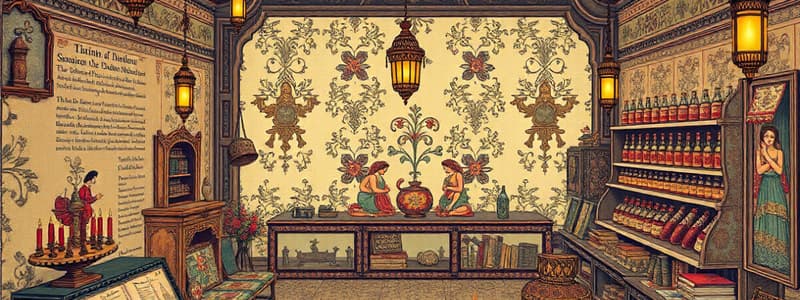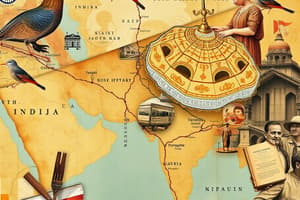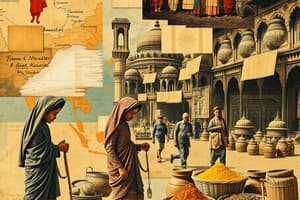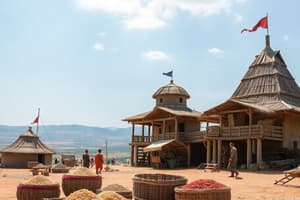Podcast
Questions and Answers
What were the primary goods that India traded with the West before the rise of the Turks in 1453?
What were the primary goods that India traded with the West before the rise of the Turks in 1453?
Spices, textiles, sugar, indigo, and saltpetre.
How did the rise of the Turks affect trade between India and Europe?
How did the rise of the Turks affect trade between India and Europe?
It disrupted the overland trade routes, making them unsafe for transporting goods to Europe.
Who was Vasco da Gama and what was significant about his voyage in 1498?
Who was Vasco da Gama and what was significant about his voyage in 1498?
Vasco da Gama was the first European explorer to reach India by sea, marking the discovery of a direct sea-route to India.
What was the Mughal emperors' initial attitude towards European explorers and traders?
What was the Mughal emperors' initial attitude towards European explorers and traders?
What was the role of European trading companies in India's regional politics during the 18th century?
What was the role of European trading companies in India's regional politics during the 18th century?
Which European nation was the first to set up a trading company in India, and why were they able to monopolize trade?
Which European nation was the first to set up a trading company in India, and why were they able to monopolize trade?
What friendly relations did Vasco da Gama establish upon reaching India?
What friendly relations did Vasco da Gama establish upon reaching India?
What impact did the establishment of European colonies have on the Mughal Empire?
What impact did the establishment of European colonies have on the Mughal Empire?
What was the significance of Albuquerque's capture of Goa in 1510?
What was the significance of Albuquerque's capture of Goa in 1510?
How did the decline of Portuguese power in India occur by the end of the 16th century?
How did the decline of Portuguese power in India occur by the end of the 16th century?
What role did the Dutch East India Company play in breaking the Portuguese monopoly?
What role did the Dutch East India Company play in breaking the Portuguese monopoly?
What important concession did Aurangzeb grant to the English East India Company in 1691?
What important concession did Aurangzeb grant to the English East India Company in 1691?
How did the city of Calcutta develop from the villages of Sutanati, Kalikata, and Gobindapur?
How did the city of Calcutta develop from the villages of Sutanati, Kalikata, and Gobindapur?
What was the nature of the French East India Company's governance compared to the English East India Company?
What was the nature of the French East India Company's governance compared to the English East India Company?
What led to the acquisition of Bombay by the British in 1668?
What led to the acquisition of Bombay by the British in 1668?
In what ways did colonization influence the architectural landscape of Indian cities?
In what ways did colonization influence the architectural landscape of Indian cities?
What geographical feature contributed to the significance of Bombay during the colonial era?
What geographical feature contributed to the significance of Bombay during the colonial era?
How did the nature of trading activities change for the English East India Company over time?
How did the nature of trading activities change for the English East India Company over time?
Flashcards are hidden until you start studying
Study Notes
Trade Patterns and European Exploration
- India’s trade with the West included spices, textiles, sugar, indigo, and saltpetre, primarily controlled by Arab traders.
- Key trade routes involved transport through the Persian Gulf and Red Sea until the Ottoman Turks disrupted land routes in 1453.
- European nations sought maritime paths to India, prompting voyages by explorers like Bartolomeo Dias and Vasco da Gama.
Vasco da Gama’s Voyage
- Vasco da Gama reached India in 1498, becoming the first European to do so via sea by navigating around the Cape of Good Hope.
- His arrival established a direct sea-route to India, facilitating trade for other European nations including the Dutch, British, and French.
- Mughal emperors initially did not perceive European traders as threats, allowing them to gain privileges and establish trading posts along the coasts.
The Portuguese Dominance
- First to establish a trading company in India, the Portuguese maintained a monopoly on Indian trade throughout the 16th century via their naval strength.
- Key figures include Vasco da Gama, who formed alliances with local rulers such as the zamorin of Calicut and the ruler of Cochin.
- Albuquerque captured Goa in 1510, making it the headquarters of Portuguese operations.
- Decline began by the end of the 16th century due to weak leadership and competition from Dutch and British traders.
The Dutch East India Company
- Founded in 1602, the Dutch East India Company broke the Portuguese monopoly in the Indian Ocean by establishing trading centers in Surat, Chinsurah, Nagapatnam, and Cochin.
- Though they were initially a strong trading power, the Dutch focused more on Southeast Asia, allowing the British to gradually overshadow them in India.
The British East India Company
- Established in 1600, gaining royal permission from Queen Elizabeth I to trade in India with profits shared with the crown.
- Sir Thomas Roe represented the Company at Jahangir's court in 1615, gaining trading rights in Surat.
- Key developments included the establishment of Fort St. George in Madras and a factory in Hooghly by 1668.
- Transition from traders to rulers occurred as Sir Josiah Child aimed for an empire, with significant gains following the defeat of Aurangzeb's forces and tax rights in Bengal.
Emergence of Calcutta
- In 1698, the East India Company acquired rights to collect taxes in Sutanati, Kalikata, and Gobindapur which later became Calcutta.
- British fortified Hooghly, developing Fort William, leading to urbanization and commerce growth in colonies, attracting Indian merchants.
French Presence in India
- The French East India Company was established in 1664, directly controlled by the French government unlike the British counterpart.
- Key possessions included fortified trading centers at Pondicherry, Chandernagore, and Mahe, but they entered the Indian market later than the British.
Acquisition of Bombay
- The British gained Bombay through a royal marriage arrangement, receiving it as a dowry in 1668 and transferring it to the East India Company.
Colonial Legacy
- Indian cities reflect the influence of European colonizers with notable architecture like the Victoria Memorial in Kolkata and other French structures in Pondicherry.
- Colonial segregation is notable in urban planning with distinct areas for local and European populations.
Studying That Suits You
Use AI to generate personalized quizzes and flashcards to suit your learning preferences.




